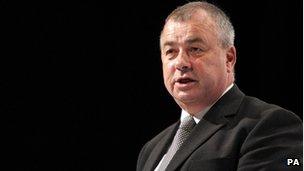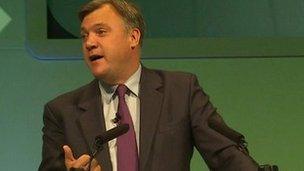TUC: General strike demands dominate union gathering
- Published

Brendan Barber's final Congress as leader saw calls for unions to fight back
Pay and general strike.
These were the key watchwords of this year's TUC conference in Brighton.
This is the week in the political calendar when industrial relations sabres are not just dusted off, but industrially rattled. And there has been quite a bit of rattling on the south coast.
Millions of public sector workers have had their salaries frozen as the government tackles the deficit.
There is now simmering anger that the existing freeze in pay, or a small rise below inflation, could continue for years.
Activists told Congress this meant people were struggling to afford school uniforms for their children and some were relying on food banks and payday loans, with their massive interest rates.
Union leaders outlined their plans in pointed terms.
Len McCluskey, the leader of the country's biggest union, Unite, said there should be a "mighty campaign of direct action, protest, civil disobedience and strike action".
Dave Prentis, the general secretary of Unison, said ministers had "declared war" on his union's members and vowed to lead a "fight back".
With language like that, it is perhaps little surprise that activists backed calls for the TUC to look into the "practicalities" of holding a general strike.
Declining muscle
But let's insert a few caveats here.
There are rather a lot of practicalities that stand in the way of co-ordinated strike action, involving millions of people at the same time.

Ed Balls' message on pay and spending was not well-received by some delegates
Firstly, finding the legal basis to do it. Secondly, finding the will amongst trade unionists to pull it off. Thirdly, finding the will amongst the wider population to support it.
The TUC, as the umbrella organisation for the trade union movement, is a broad church. For some, even talk of a general strike is a mistake.
"We risk alienating the public and handing the coalition the propaganda it needs," said Chris Keates, the leader of the teachers' union the NASUWT.
Others agreed. Add to that, the simple reality that trade unions are not as powerful a force as they once were.
Government figures show around 6.4 million employees in the UK were trade union members last year. There has been a fall of around half a million members in the last four years.
The current total was last as low as it is now in the 1940s. In the late 1970s and early 1980s, 13 million people were in a trade union.
An indication of that declining muscle were the numbers in the hall when the outgoing TUC General Secretary, Brendan Barber, gave his farewell address to members.
The chairs on the conference floor were occupied. But there were very few in the gallery above.
Labour tightrope
Enter then, stage centre left, the two Eds. The Labour leader Ed Miliband and Ed Balls, his shadow chancellor.
Both made an appearance here in Brighton, whilst talk of strikes swirled in the sea air.
Managing the relationship between the unions and the Labour Party has always been tricky. But it is particularly tricky for Ed Miliband, who was elected as leader because of their support.
Option one for him is this: Agree with the people who financial contribution to the party is vital. The outcome? Your critics wheel out the 'Red Ed' label and say you are in the unions' pockets.
Option two for him is this: Tell the unions they are behaving like they are in the Stone Age and should grow up. Then you are biting the hand that feeds you.
So option three is, in reality, the only option: Walk along that thin and slippery tightrope of an argument in which you say no one wants to see strikes happen, but you understand why people are angry. It means your critics both on the left and the right will criticise you.
Talk of a general strike is probably just that. But the talk matters because it frames the political debate on the issue.
The subject featured at Prime Minister's Questions back at Westminster.
The prime minister, the chancellor and others condemn talk of a general strike as futile and irresponsible.
But given the last one was way back in 1926, ten years before Fred Perry won his last tennis major, let alone Andy Murray, there is little wonder rhetoric about it on the Brighton seafront is resonating beyond the conference hall.
- Published11 September 2012
- Published10 September 2012
- Published10 September 2012
- Published11 September 2012